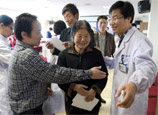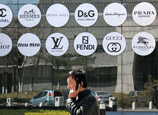
Latest official PMI shows potential downside risks for China's economy
Modest growth is likely to be maintained in China, helped by ongoing structural reforms, despite it still facing some strong headwinds, particularly eurozone recession and sluggish US demand, experts said on Friday.
They were reacting to the latest official economic figures, which showed that China's non-manufacturing sector contracted in April. The figures, released by the National Bureau of Statistics, showed the purchasing managers index for the non-manufacturing, or services, sector stood at 54.5 percent in April, down 1.1 percentage points from March.
"The figure still remained above 50, which means a continuing expansion of the services sector," said Pan Jiancheng, deputy director-general at the China Economic Monitoring and Analysis Center under the NBS.
Catering, transport and maintenance firms had fewer new orders in April, which Pan blamed on subdued government spending, while new orders for hotels, telecommunications, broadcasting, television and satellite transmission services fared better.
Official figures on Wednesday had showed factory production registered slower growth in April, indicated by the 50.6 manufacturing PMI, down from 50.9 in March.
The non-manufacturing PMI is based on a survey of about 1,200 companies in 27 industries, including transportation, real estate, catering and software development.
Some global hedge fund holders, including James Chanos from Kynikos Associates, highlighted the potential downsides for China, and said he was betting on a "hard landing" when the real estate market collapses and the banks see systemic crisis.
Wang Jun, a senior economist with the China Center for International Economic Exchanges, a government think tank, said: "Slowdown risks should be taken seriously, but I am in no doubt that GDP growth will keep above 7.5 percent this year.
"It is unlikely the government will release any strong stimulus package this year, as a more important task is to improve growth quality and accelerate structural reforms."
The government stated, after a meeting on April 25, it planned to keep its macro economics policy "stable and flexible", as well as focus on the quality and profitability of growth.
It also pointed to controlling local government financing vehicles and guarding against rapid credit growth, by regulating the fund-raising activities of local governments.
 |
















 In pictures: Henan construction site collapse kills 7
In pictures: Henan construction site collapse kills 7


![]()
